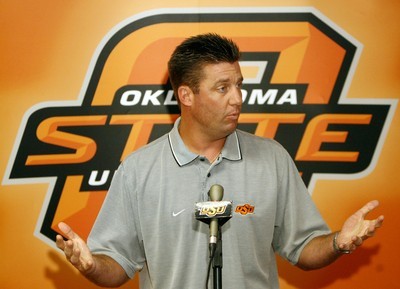Gundy’s cartoonish tantrum blurs valid point

Mike Gundy made a predictable mistake Saturday. He chose to spend nearly four minutes ranting and raving and trying to succeed at a battle in a war he will never win. He tried to publicly embarrass another only to humiliate himself.
Gundy chose lunacy over decorum to voice an opinion he had every right to state. In this, the crazed coach always comes off looking like a nutcase, which is a shame for this reason: Often, as with the situation concerning Gundy, a valid message is destroyed by an immature delivery.
Welcome to the long-standing confrontation known as head coach versus media, a conflict that has greatly increased in volume and resentment over the years.
Gundy is the Oklahoma State football coach who used his postgame pulpit not to praise his team for a 49-45 win against Texas Tech, but instead for an open tirade to criticize and deride a local columnist for her piece on quarterback Bobby Reid. If you haven’t seen the outburst, search YouTube like the other 100,000 or so have the past few days.
That’s the point, isn’t it?
The world was forever altered the first time someone typed www. into a search engine, which means stories that would draw no attention beyond the minute limits of a state’s second-best program instead become instant topics for national debate. Not many fans outside Stillwater, Okla., and the Big 12 Conference knew Mike Gundy before Saturday.
They do now for all the wrong reasons.
There is nothing incorrect with Gundy defending his player. He is entitled to as much of a public stance as the columnist. He has as much right to voice those beliefs in his news conference as she did in print. He just handled it terribly wrong.
“In my mind, that was not the format to do it,” UNLV coach Mike Sanford said. “There are some things I really agree with what he said about writing about innuendo and (rumors). I like Mike. He is a friend of mine. But it wasn’t the right place, especially after such a big win for them.”
The coach-media relationship has grown more and more contentious as egos on both sides have swelled. Print journalism has become increasingly more invasive and opinionated in a time when game facts and statistics are immediately available on the Internet and long before the paper arrives on your driveway. You hear it all the time in my business. Give them more analysis. More attitude. More cutting-edge judgments.
It’s also true coaches are still some of the more paranoid sorts on the planet and annually become more secretive and vague when discussing their teams. They would rather deliberately lie to a reporter than expose what are often trivial details only themselves and their staff consider significant.
(On that point, the next time any coach says he or she doesn’t read stories or columns about their team in the newspaper, give the person a towel to conceal their expanding nose. They all read them because it would be ludicrously irresponsible not to.)
It makes for a pretty obvious conclusion between writer and coach: At some point, the sides collide.
Read the column about Reid. Decide for yourself whether the author disregarded facts about the quarterbacks’s on-field performance for a more personal condemnation of his supposed lack of toughness. Assess her writing ability. Agree or not with every word. It’s all fair and acceptable in the world of column writing and I have an overflowing e-mail box to prove it.
If you watch Gundy’s explosion following the win, then his weekly news conference Monday, there’s no debating his allegiance to his quarterback. That’s a great thing. But to suggest the ability of Division I athletes on full scholarships is not open to thorough analysis is as naive as it is mistaken. Gundy also said three-fourths of the column was inaccurate, then refused to disclose which parts, which only made his position weaker.
This was Gundy on Monday: “I certainly didn’t do it to receive recognition and I certainly don’t want it to take away from this upcoming game (against Sam Houston State) like it unfortunately took away from the last game for the team.”
He took away from the last game.
He made it a big deal.
He had a valid message and delivered it in a juvenile way instead of preparing a statement (which Gundy later said he regretted not doing) or facing the writer privately.
He tried to succeed at a battle in a war he will never win, but that doesn’t mean he shouldn’t have the option to fire back.
The next time, though, Gundy needs to grow up and shoot like the man he claims to be and not the child he portrayed.
Ed Graney’s column is published Wednesday, Thursday, Saturday and Sunday. He can be reached at 383-4618 or egraney@reviewjournal.com.
ED GRANEYMORE COLUMNS











